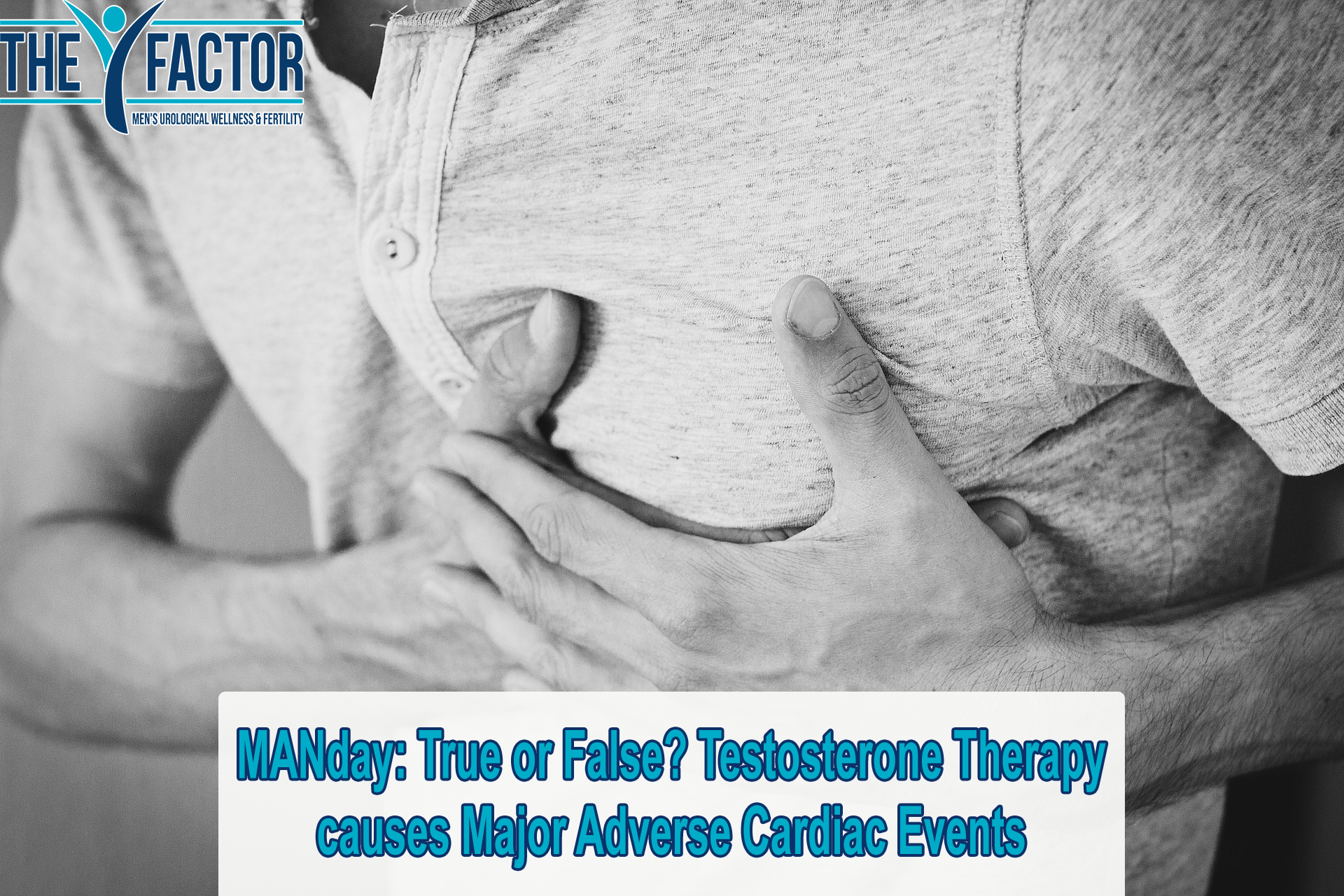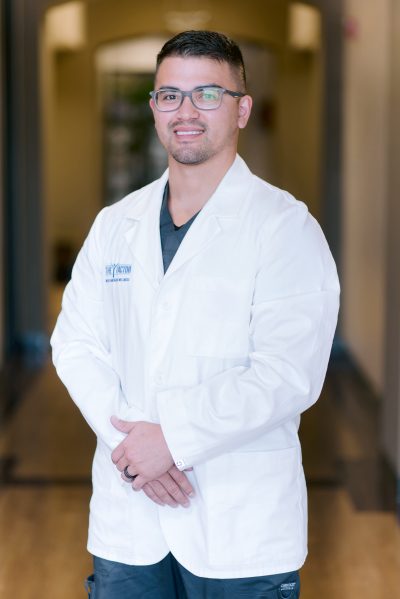True or False? Testosterone Therapy causes Major Adverse Cardiac Events (MACE)
Major Adverse Cardiac Events (MACE) can be defined as death, heart attacks, coronary interventions such as cardiac stent placement, stroke or heart failure. There has been a tug and pull between whether testosterone treatment increases or decreases MACE. Fears have developed with testosterone therapy causing MACE in the past decade due largely in part to 2 studies. The first study responsible for the fears associated with testosterone treatment, Vigen et al., 2013, essentially looked at the prevalence of preceding research studies that were prematurely stopped due to adverse cardiovascular events. The association between low testosterone level and cardiovascular events have been well established that will be discussed later. However, in this particular study 8,709 men with low testosterone levels were included. Of those men, 7,486 men were NOT receiving testosterone therapy and a total of 1,587 (21%) of men experienced cardiac events. Of the remaining men, 1,223 received testosterone therapy and a total of 123 (10%) experienced cardiac events. Their results however indicated that testosterone therapy could increase your risk of MACE. Ultimately, the authors officially corrected their initial conclusion from “Use of testosterone therapy in this cohort of veterans with significant medical comorbidities was associated with increased risk of mortality, MI, or ischemic stroke” to “there was no significant difference in the effect size of testosterone therapy among those with and without coronary artery disease” which after scrutiny, realized a lower percentage of adverse cardiovascular events in the testosterone treatment group.
The second article responsible written by Finkle et al., 2014, investigated men who filled phosphodiesterase inhibitors (PDE5) (i.e. Viagra, Cialis, ect) vs. men who fill testosterone therapy prescriptions and found a higher prevalence of cardiovascular events in the population undergoing testosterone therapy. The pitfalls of this study is that no official control group was used for comparison. In addition, using PDE5 as a comparison group can skew your population since this population of patients is can potentially be healthier since they can perform sexual activity versus a group of patients who might not be healthy enough to perform sexual activity.
These two studies gained significant media attention which eventually led to the FDA opening a formal investigation finding 4 articles that suggested risk which led to a FDA warning. However, in comparison, more than 100 studies have reported reduced CV risk with higher endogenous T concentration, improvement of known CV risk factors with T therapy, and reduced mortality in T-deficient men who underwent TRT versus untreated men” (Goodale et al., 2017). The Mayo Clinic, the number one hospital in America, ultimately concludes, “There is no credible evidence at this time that T therapy increases CV risk and substantial evidence that it does not. Indeed, there is a strong signal that T therapy may offer CV benefits to men.”
Currently, a 5-year clinical research study deemed the “Traverse study” which includes 6,000 participants has embarked on the mission to “determine the CV [cardiovascular] safety and long-term efficacy of testosterone treatment in middle-aged and older men with hypogonadism with or at increased risk of CV disease.” The study concluded 6/22/22 of this year and the medical community is still awaiting results.
At The Y Factor, we follow AUA (American Urological Association) guidelines and always meet with you, the patient, and discuss that “at this time, it cannot be stated definitively whether testosterone therapy increases or decreases the risk of cardiovascular events (e.g., myocardial infarction, stroke, cardiovascular-related death, all cause mortality).” In addition to the above, the AUA has also stated that, “Patients should be informed that there is no definitive evidence linking testosterone therapy to a higher incidence of venous thromboembolic events.”
REFERENCES
Finkle, W. D., Greenland, S., Ridgeway, G. K., Adams, J. L., Frasco, M. A., Cook, M. B., Fraumeni, J. F., Jr, & Hoover, R. N. (2014). Increased risk of non-fatal myocardial infarction following testosterone therapy prescription in men. PloS one, 9(1), e85805. https://doi.org/10.1371/journal.pone.0085805
Goodale, T., Sadhu, A., Petak, S., & Robbins, R. (2017). Testosterone and the Heart. Methodist DeBakey cardiovascular journal, 13(2), 68–72. https://doi.org/10.14797/mdcj-13-2-68
Morgentaler, A., Zitzmann, M., Traish, A. M., Fox, A. W., Jones, T. H., Maggi, M., Arver, S., Aversa, A., Chan, J. C., Dobs, A. S., Hackett, G. I., Hellstrom, W. J., Lim, P., Lunenfeld, B., Mskhalaya, G., Schulman, C. C., & Torres, L. O. (2016). Fundamental Concepts Regarding Testosterone Deficiency and Treatment: International Expert Consensus Resolutions. Mayo Clinic proceedings, 91(7), 881–896. https://doi.org/10.1016/j.mayocp.2016.04.007
Vigen, R., O’Donnell, C. I., Barón, A. E., Grunwald, G. K., Maddox, T. M., Bradley, S. M., Barqawi, A., Woning, G., Wierman, M. E., Plomondon, M. E., Rumsfeld, J. S., & Ho, P. M. (2013). Association of testosterone therapy with mortality, myocardial infarction, and stroke in men with low testosterone levels. JAMA, 310(17), 1829–1836. https://doi.org/10.1001/jama.2013.280386
Mike Manis is a board-certified nurse practitioner with a master’s of science in nursing.Mike brings 8 years of nursing experience to The Y Factor. He graduated with honors in 2012, cum laude, with a bachelor of science in nursing. He was also inducted into the national honor society and also received the honorary Dean’s Award. He worked in the area of emergency medicine at Houston Methodist, a Magnet Hospital. While there, he pioneered advanced educational nursing programs, received honorary rewards, and became a certified emergency nurse.
In 2020, Mike earned his master’s degree as a family nurse practitioner to advance his career. Mike was also class president of his graduating class of 2020.
Want more information?
Ready to schedule you appointment? Just click on the call us button below to speak directly with our team.


